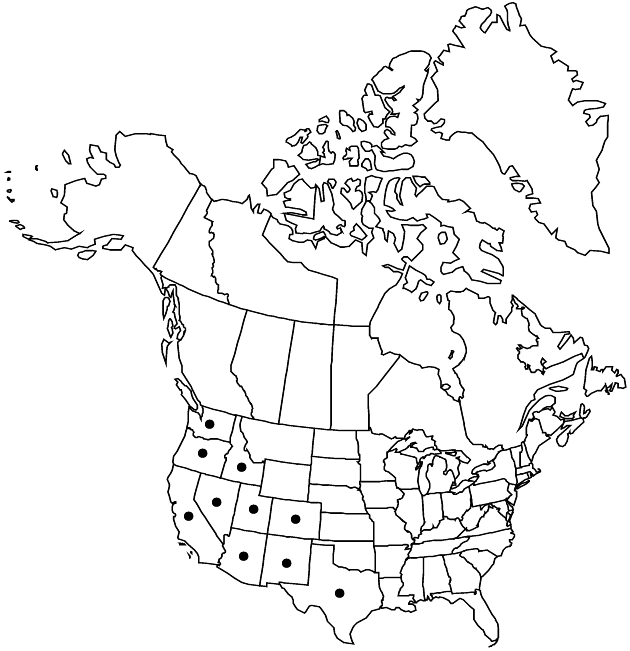Difference between revisions of "Stephanomeria exigua"
Trans. Amer. Philos. Soc., n. s. 7: 428. 1841.
FNA>Volume Importer |
imported>Volume Importer |
||
| Line 8: | Line 8: | ||
}} | }} | ||
|common_names=Small wirelettuce;skeletonplant | |common_names=Small wirelettuce;skeletonplant | ||
| + | |special_status={{Treatment/ID/Special_status | ||
| + | |code=F | ||
| + | |label=Illustrated | ||
| + | }} | ||
|basionyms= | |basionyms= | ||
|synonyms= | |synonyms= | ||
| Line 20: | Line 24: | ||
-->{{Treatment/Body | -->{{Treatment/Body | ||
| − | |distribution= | + | |distribution=Ariz.;Calif.;Colo.;Idaho;N.Mex.;Nev.;Oreg.;Tex.;Utah;Wash.;nw Mexico. |
|discussion=<p>Subspecies 5 (5 in the flora).</p> | |discussion=<p>Subspecies 5 (5 in the flora).</p> | ||
|tables= | |tables= | ||
| Line 74: | Line 78: | ||
|basionyms= | |basionyms= | ||
|family=Asteraceae | |family=Asteraceae | ||
| − | |distribution= | + | |distribution=Ariz.;Calif.;Colo.;Idaho;N.Mex.;Nev.;Oreg.;Tex.;Utah;Wash.;nw Mexico. |
|reference=None | |reference=None | ||
|publication title=Trans. Amer. Philos. Soc., n. s. | |publication title=Trans. Amer. Philos. Soc., n. s. | ||
|publication year=1841 | |publication year=1841 | ||
| − | |special status= | + | |special status=Illustrated |
| − | |source xml=https:// | + | |source xml=https://bibilujan@bitbucket.org/aafc-mbb/fna-data-curation.git/src/bb6b7e3a7de7d3b7888a1ad48c7fd8f5c722d8d6/coarse_grained_fna_xml/V19-20-21/V19_552.xml |
|tribe=Asteraceae tribe Cichorieae | |tribe=Asteraceae tribe Cichorieae | ||
|genus=Stephanomeria | |genus=Stephanomeria | ||
Revision as of 20:38, 27 May 2020
Annuals, 10–200 cm (taproots relatively large). Stems single, branches divaricately or freely spreading, glabrous or sparsely pubescent. Leaves withered at flowering; basal blades linear to oblanceolate, runcinate, 3–10 cm, margins pinnately lobed; cauline much reduced, bractlike. Heads borne singly or clustered along branches or in paniculiform arrays. Peduncles 2–10 mm (along branches), or 10–40 mm (in paniculiform arrays). Calyculi of appressed or reflexed bractlets (glabrous, pubescent, or stipitate-glandular). Involucres 5–7 mm (glabrous, puberulent, or densely stipitate-glandular). Florets 5–11. Cypselae light tan to dark brown, 2.1–6.8 mm, faces smooth to tuberculate, grooved; pappi of 5–24 tan or white bristles (falling or widened bases persistent, bases connate in groups of 2–4 distal portions breaking off), plumose on distal 50–85%. 2n = 16.
Distribution

Ariz., Calif., Colo., Idaho, N.Mex., Nev., Oreg., Tex., Utah, Wash., nw Mexico.
Discussion
Subspecies 5 (5 in the flora).
Selected References
None.
Lower Taxa
Key
| 1 | Heads borne singly or clustered along branches; peduncles 2–10 mm | > 2 |
| 1 | Heads in paniculiform arrays; peduncles 10–40 mm | > 3 |
| 2 | Calyculus bractlets appressed; peduncles 2–5 mm | Stephanomeria exigua subsp. coronaria |
| 2 | Calyculus bractlets reflexed; peduncles 5–10 mm | Stephanomeria exigua subsp. macrocarpa |
| 3 | Calyculus bractlets reflexed | Stephanomeria exigua subsp. carotifera |
| 3 | Calyculus bractlets appressed | > 4 |
| 4 | Peduncles and involucres densely glandular | Stephanomeria exigua subsp. deanei |
| 4 | Peduncles and involucres glabrous or sparsely glandular | Stephanomeria exigua subsp. exigua |